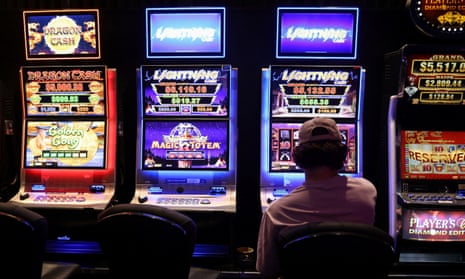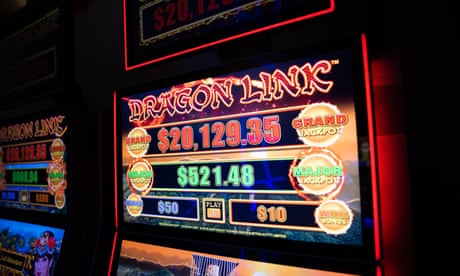Voluntary exclusion process faces renewed criticism as advocates call for reforms ahead of state election.

The schemes allow people to voluntarily ban themselves from gambling but are commonly capped at 35 venues near where they live, work and socialise.
Now the mandatory schemes – which are run by both ClubsNSW and individual casinos – are facing renewed criticism as advocates, health experts and the state’s crime commission call for more gambling reforms ahead of the state election later this year.
Greg, a problem gambler in Sydney’s inner-west who is desperate to quit poker machines, said the 35-venue cap was ineffective given how many gambling venues exist in his area.
“It’s too easy to just get in your car and drive five kilometres down the road, even 10 kilometres, who cares, and then gamble just the same somewhere else,” said Greg, whose last name has been withheld to protect his privacy.
“How are you supposed to remember every place around you? And 35 places? That’s like two postcodes here, so it just absolutely doesn’t work at all.”
In the Canterbury-Bankstown local government area there are 4,741 poker machines, according to NSW Liquor and Gaming’s latest figures. There are 3,841 machines in Fairfield, 2,838 in Blacktown, and 1,823 in the inner west.
Greg said his life would be better if he could ban himself from every poker machine in the state at once.
“You can’t stop if everywhere you go there are ‘Las Vegas’ lights and ‘$100,000 jackpot’ flashing everywhere. You won’t be able to do it. This is worse than a drug,” he said.
“I feel sorry for the young people who go and put their first $50 through the machines and win a jackpot, because that’s the beginning of the end of their lives.”
ClubsNSW has been running a self-exclusion service, ClubSAFE, for more than a decade. In a statement, a ClubsNSW spokesperson said the 35 venue limit was sufficient for most problem gamblers.
“However, this is a soft limit and in circumstances where an individual requests to be excluded from additional venues, this is easily facilitated,” the spokesperson said.
“In October last year, ClubsNSW and the Australian Hotels Association NSW announced the rollout of facial recognition technology in the gaming areas of clubs and pubs across the state to further combat problem gambling.
“The technology will become a major part of the multi-venue self-exclusion scheme, and once fully implemented, will allow patrons to self-exclude from every club and pub in the state.”
The Wesley Mission and other advocates are calling for a range of reforms before the state election on 25 March, including a cashless gaming card, midnight closing hours and a statewide self-exclusion register.
“The current patchwork system in NSW is ineffective at providing support to the people who need it most,” said Wesley Mission’s general manager Jim Wackett.
“A range of hurdles, from limits on the number of venues from which a person can self-exclude to a cumbersome application process, renders the current system deeply flawed.”
Wackett said while every gambling venue is required to offer self-exclusion, enforcement was lacking because there is no legal obligation to enforce the scheme.
“Our gambling counsellors are often hearing stories from clients who have tried to exclude themselves from venues, but they must approach each venue in turn,” he said.
“The ubiquity of poker machines on almost every street corner across the suburbs and towns of NSW making meaningful exclusion impossible.”

No comments:
Post a Comment